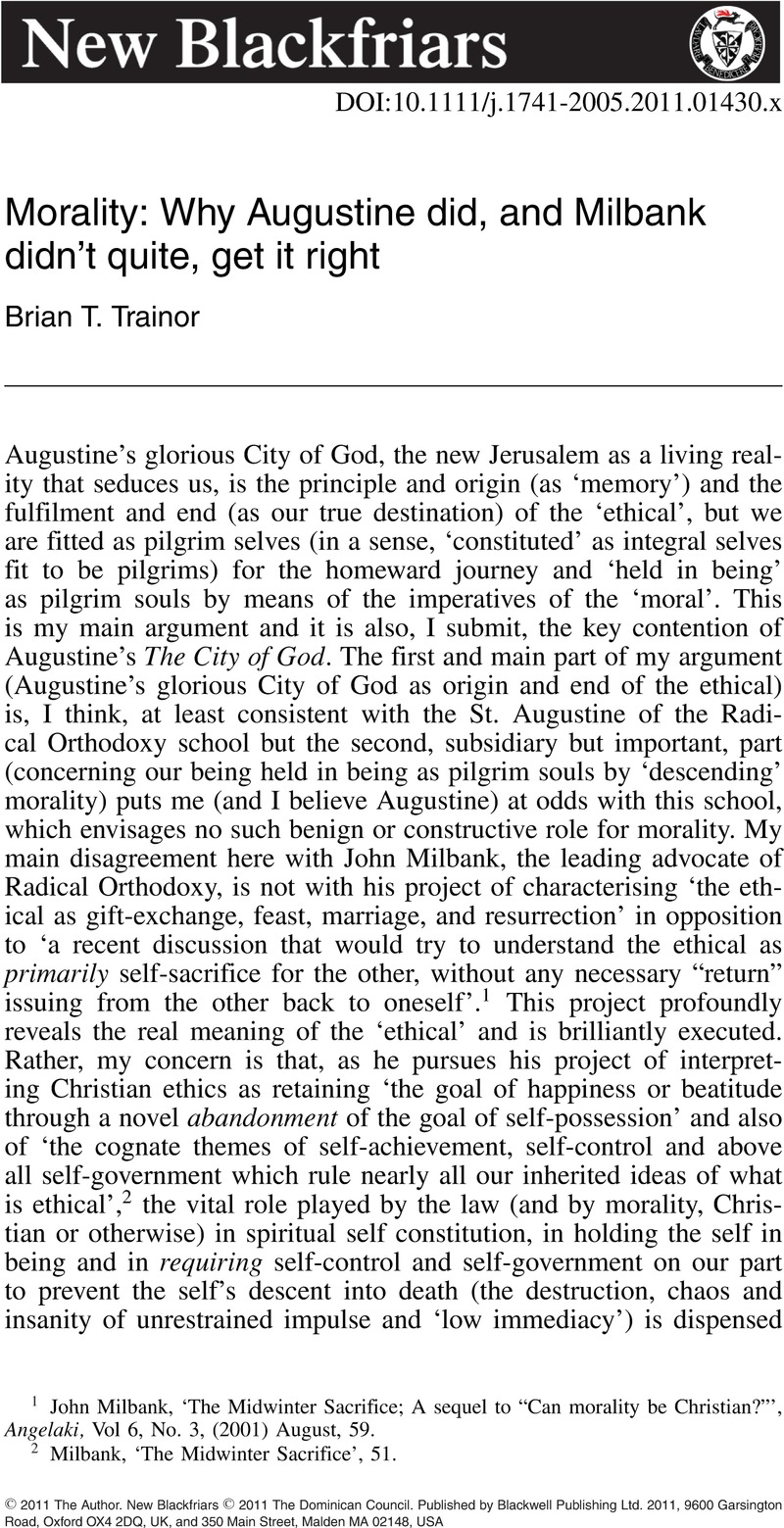No CrossRef data available.
Article contents
Morality: Why Augustine did, and Milbank didn't quite, get it right
Published online by Cambridge University Press: 01 January 2024
Abstract

- Type
- Original Articles
- Information
- Copyright
- © 2011 The Author. New Blackfriars © 2011 The Dominican Council
References
1 Milbank, John, ‘The Midwinter Sacrifice; A sequel to “Can morality be Christian?”’, Angelaki, Vol 6, No. 3, (2001) August, 59CrossRefGoogle Scholar.
2 Milbank, ‘The Midwinter Sacrifice’, 51.
3 Milbank, ‘The Midwinter Sacrifice’, 53.
4 Augustine, , The City of God, ed. Knowles, David, (London: Penguin Books, 1976), 1. PrefaceGoogle Scholar.
5 Augustine, City of God, XV. 2.
6 Augustine, City of God, XV. 2. (Gal. 4, 21–25).
7 Augustine, City of God, XV. 2.
8 Augustine, City of God, XV. 2.
9 Augustine, City of God, XV. 3.
10 Augustine, City of God, X1X. 13.
11 Augustine, City of God, X1X. 13.
12 Milbank, John, Theology and Social Theory; Beyond Secular Reason, (Blackwell, Oxford, 2006) 392CrossRefGoogle Scholar.
13 Oliver, O’Donovan and Joan Lockwood O’Donovan, ‘The Political thought of City of God’ in Bonds of Imperfection: Christian Politics, Past and Present, (Grand Rapids, MI: Eerdmans, 2004), 59Google Scholar.
14 Cavanaugh, William T., “From One City to Two: Christian Reimagining of Political Space”, Political Theology 7, no 3 (2006): 309CrossRefGoogle Scholar.
15 Cavanaugh, “From One City to Two”, 311.
16 Milbank, John, “Can Morality be Christian?” in The Word Made Strange; Theology, Language, Culture (Blackwell, Oxford, 1998) 225Google Scholar.
17 Milbank, “Can Morality be Christian?”, 225.
18 Milbank, “Can Morality be Christian?”, 219.
19 Milbank, “Can Morality be Christian?”, 225.
20 Augustine, City of God, XIX. 14.
21 Karl Barth, Church Dogmatics, II/2, 511.
22 Barth, Karl, “Gospel and Law” in Community State and Church ed. Herberg, W. (Doubleday; New York, 1960), 80Google Scholar.
23 Barth, “Gospel and Law”, 80.
24 Derrida, Jacques, “Force of Law. The Mystical Foundation of Authority”, Cardozo Law Review, 11:5–6, (1990), 929Google Scholar.
25 Derrida, “Force of Law”, 925.
26 For a more extended discussion, see … … … . .
27 Barth, Church Dogmatics, II/2, 511.
28 Milbank, “Can Morality be Christian?”, 228. Milbank takes exception to what he calls the ‘ascription to me [by Insole, Christopher The Politics of Human Frailty; A Theological Defence of Political Liberalism, SCM Press, London, 2004Google Scholar)] of a kind of blithe willful May time optimism’ that ‘entirely ignores my Pauline insistence on the utter fallenness and demonic captivity of the current world’ (Theology and Social Theory; Beyond Secular Reason, Blackwell, Oxford, 2006, Preface p. xv). What is missing, however, in his work (missing, I believe, because deemed unnecessary) is any account of the transition (and especially the role of law/morality in this transition) from fallen, demonic captivity to what he calls ‘the hidden realm of real peaceful being that cosmic evil obscures from our view’ (Preface p. xv).
29 Milbank, “Can Morality be Christian?”, 228.
30 Milbank, “Can Morality be Christian?”, 220. If it is the case, as Milbank (following William Blake) asserts, that ‘every act of mercy, in so far as it rejoices in itself, rejoices also in its [evil] occasion’ (“Can Morality be Christian?”, 219), then it is also true that every act of mercy, to the degree that it does not rejoice in itself, rejoices in its divine cause or true substance and is, indeed, an overflow into time of its true substance, of divine mercy itself.
31 Milbank, “Can Morality be Christian?”, 220.
32 Milbank, “Can Morality be Christian?”, 220.
33 Milbank, “Can Morality be Christian?”, 221.
34 In … … … I describe how faith plays a role in these journeyings of the self, how our human ‘inner’ subjective is both lured into, and subject to, the ‘outer’ imperatives of its divine ‘objective’ and how faith draws into symbiotic union and ‘intensifies’ (brings about a fuller subjective apprehension on our part of) the ‘for-each-otherness’ of the human subjective and the divine objective.
35 Milbank, “Can Morality be Christian?, 222.
36 Milbank, “Can Morality be Christian?, 223.
37 This point is further elaborated in … … … … .
38 Milbank, “Can Morality be Christian?, 224.
39 Bradley, F.H., Ethical Studies (The Clarendon Press, Oxford, 1988), 68Google Scholar.
40 Bonhoeffer, Dietrich, Ethics, (SCM Press, London, 1963), 3Google Scholar.
41 Bonhoeffer, Ethics, p. 4.
42 Augustine, City of God, X1X. 14.




